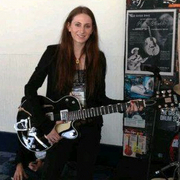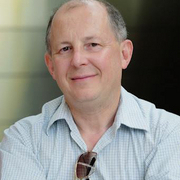
|
|
Advocating for Arts and Culture in Greater PhiladelphiaMeet some of your fellow arts advocates who will be joining us at our Arts Advocacy Day Phone Bank on March 25th!
We are so grateful for the continued support of our fellow do-gooders - whether it's helping us beautify a park, collecting books for schoolchildren, or joining us at City Hall as we advocate for arts and culture, we could not do our work without you. That's why we're excited to see even more people will be joining us at one of our FOUR phone bank locations on Tuesday, March 25th, as we reach out to our elected officals to let them know why arts and culture matter to our communities. We recently got in touch with a few of our fellow advocates to find out what advocacy and the chance to participate in the phone bank mean to them. Meg Clifton Mitchell
GS: Why are you participating in the Arts Advocacy Day Phone Bank? Why do you feel advocating for arts and culture is so important? MCM: Any opportunity to advocate and speak up for and about the Arts, I'm there! The arts and culture is our economic engine and are the languages that all people speak. The arts cut across racial, cultural, social, educational, and economic barriers and enhance awareness, appreciation, and the quality of life. GS: What kind of advocacy/volunteer efforts have you been a part of in the past? MCM: I joined my friend and colleague, Amy Scheidegger, for the creation of the Artistic Rebuttal Book Project as the Deputy Director in 2011. This project is a national arts advocacy effort in which artists and art lovers submit their own statement on the importance of art in society to be published in a book to help convince those who aren't as sold on the necessity of art that art is essential. GS: What kind of impact do you think it had on your immediate community/organization/the sector as a whole? MCM: This project gained recognition and attention by many and is still generating awareness of the importance of the arts and culture. GS: At Arts Advocacy Day, attendees are often told that personal stories often make the most impact when speaking with legislators. Do you have a personal story regarding arts and culture that you think would make an impression on our elected officials? MCM: The arts change lives, inspires, and increases academic achievement, supports social and emotional development, civic engagement, and equitable opportunity. My life is dedicated to the arts and culture and that comes from being inspired everyday by the rich arts and cultural opportunities in Philadelphia. I feel fortunate to work at an organization that provides children with their very first arts and culture experience.
Briana Pfleegor
GS: Why are you participating in the Arts Advocacy Day Phone Bank? Why do you feel advocating for arts and culture is so important? BP: Unfortunately, my schedule didn't allow for me to attend Arts Advocacy Day this year, but when I heard about the AAD Phone Bank I felt it was an opportunity I couldn't pass up. It's important for me to give back to the community that has given so much to me. I believe advocating for something that has significance to you is important. People are the direct result of change. However, I've found there's often a stigma that comes with advocating for the arts. It's easy for some to look down on the arts and cheapen their value to society when there are so-called "bigger" battles to be fought. To me, the arts are just as important as these other areas. The arts can help us to heal, grow as individuals, and express ourselves among many other things. I was lucky enough to spend my early education in an art centric environment and then went on to continue my studies at an art school. The arts have touched me and shaped me in a powerful way. I feel I owe much of my success to my background and involvement in the arts. The thought of denying arts education to future generations doesn't sit well with me. GS: What kind of advocacy/volunteer efforts have you been a part of in the past? What kind of impact do you think it had on your immediate community/organization/the sector as a whole? BP: I currently serve on the Recording Academy's Grammy U Influencer Corps. Essentially, what we do is begin a conversation. There are so many articles out there these days and everyone has their own agenda. One of the things I think we often take advantage of in the digital age is our ability to make our voices heard through commenting in real time. Every minor and major news publication has the option for readers to share their opinions underneath the piece. This is an opportunity I exercise often, even when I'm not on assignment for the Corps. I believe in the power of the voices of many. You'd be surprised how many passionate, well-informed opinions rest in the comments section of many of these articles. In terms of impact, I've seen adjustments made to articles frequently based on the feedback of others. People are no longer willing to accept a one-sided story. I see this new, interactive form of disseminating news enacting great change in the future as more people begin to exercise their opinions. GS: At Arts Advocacy Day, attendees are often told that personal stories often make the most impact when speaking with legislators. Do you have a personal story regarding arts and culture that you think would make an impression on our elected officials? BP: I was lucky enough to attend the National Association of Music Merchants (NAMM) Conference in Anaheim in January of 2013. It was my first experience being surrounded by thousands of musicians, music retailers, music attorneys, music business professionals, and aspiring music industry students like myself. The passion that could be felt throughout the Anaheim Convention Center was electric. I didn't meet a single person during my time at NAMM that wasn't genuinely enthralled with the music industry. However, no matter who I spoke to, from a musician with a top ten single on the Billboard charts to a small time music retailer, one recurring theme presented itself: the difficultly of making an honest living in music in the digital age. Much of this difficultly stems from outdated Copyright laws that don't reflect the reality of creation in the digital sphere. This experience began my descent into wanting to advocate for the next wave of music industry professionals.
Mikhail Zorich
GS: Why are you participating in the Arts Advocacy Day Phone Bank? Why do you feel advocating for arts and culture is so important? MZ: I have been involved with Arts and Culture in the Philadelphia area for the last 15 years and know firsthand how scarce are resources. On the other hand, not many politicians understand how important Art and Culture are for the healthy and prosperous society and do need constant reminder. In addition, as we all know too well, Arts and Culture organizations cannot afford to hire a lobbyist. GS: What kind of advocacy/volunteer efforts have you been a part of in the past? What kind of impact do you think it had on your immediate community/organization/the sector as a whole? MZ: I have participated in Arts Advocacy Day in Washington D.C. back in 2007 and found it incredibly useful. It allowed me to establish useful contacts with political offices - I learned to talk their language and put my organization (at the time) on the radar. GS: At Arts Advocacy Day, attendees are often told that personal stories often make the most impact when speaking with legislators. Do you have a personal story regarding arts and culture that you think would make an impression on our elected officials? MZ: I am currently heavily involved in the creation of the first mural in Northeast Philadelphia that celebrates "Cities of Origin" of the Russian-speaking community. During the process of setting up legal framework, I have an opportunity to meet several elected officials in Northeast Philadelphia. The ability to convince them that this project is doable and will enrich and beautify the community they are serving was incredibly helpful in getting it off to a good start. ---------- If you have a personal story about how art and culture has impacted your life, we hope you can join us on March 25th - come meet your fellow arts advocates and let Congress know your story - help us ensure that art and culture will always have a place in our communities!
|
|
|
Meet some of your fellow arts advocates who will be joining us at our Arts Advocacy Day Phone Bank on March 25th! |
|
|
|
The work of the Greater Philadelphia Cultural Alliance is made possible through the generous support of committed individuals and institutions. |





